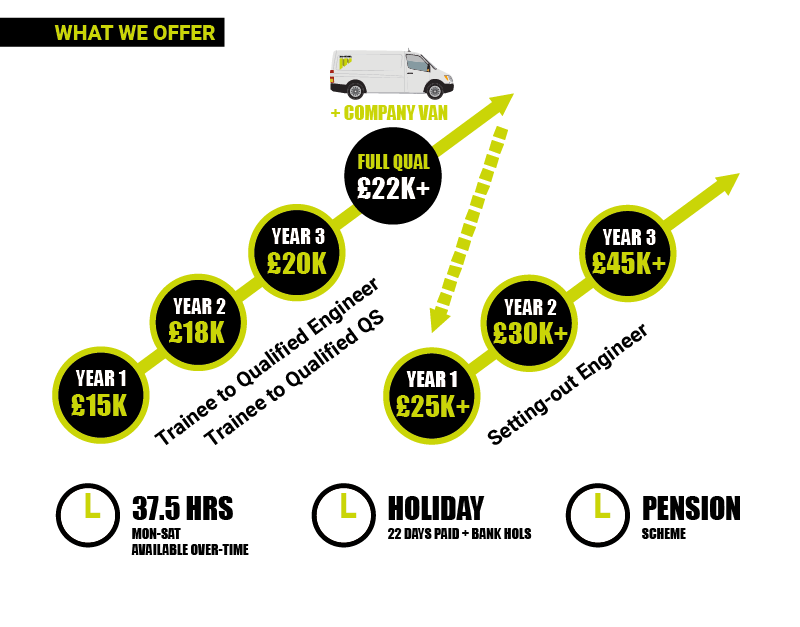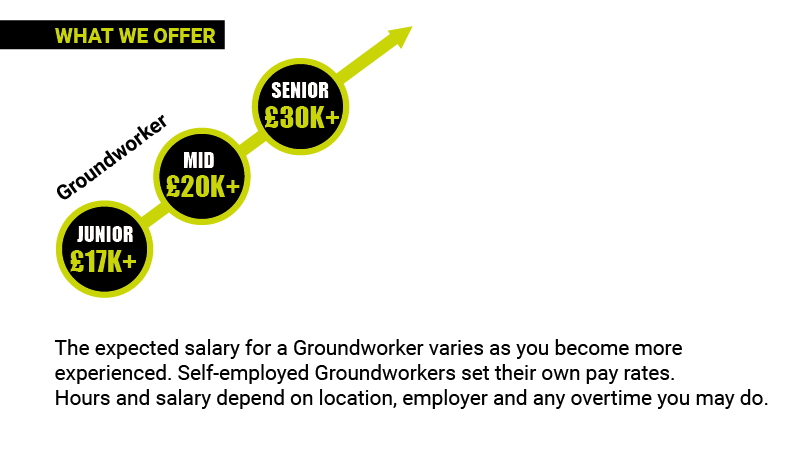Trainee: Engineer and Quantity Surveyor
An apprenticeship with Moortown Group is a good way into the industry. Apprenticeships are open to anyone over the age of 16. As an apprentice, you will be fully employed by your company and expected to work a minimum of 30 hours a week. Your time will be split between on-the-job experience and a college or training provider. You could complete an apprenticeship in Construction and the Built Environment to start you on your career path to being a setting out engineer. You could then do more specific setting out qualifications on-the-job once you gain a permanent position.
The type of people we’re looking for
We’re looking for people who love a bit of adventure in their work – who enjoy working outside and don’t mind getting their hands dirty. People who love knowing how things work and how to fix them before they are broken. People who are fascinated by learning how to use new systems and tools and most importantly, people who work best part of a team.
A day in the life
Setting out engineers use site plans, technology and precision instruments to pinpoint and mark structural features above and below ground before construction work begins. They use clear markers to indicate where structures are going to be installed, including access roads, foundation, gas, electricity and water facilities, and drainage systems. They ensure that workers on the site adhere to these markers.
Skills you need
You don’t need any previous engineering experience or qualifications to join our trainee engineer programme. We’ll provide you with world-class training and you will always be supported by your manager and your team.
There’s no barrier to becoming a trainee engineer other than you own enthusiasm for the job and we welcome application from people of all backgrounds. If you think this sounds up your street, get in touch – we’d love to tell you more about it.
Additional skills which may benefit anyone looking to become a setting out engineer include:
- Knowledge of buildings and construction
- Excellent attention to detail
- Strong communication skills
- Ability to interpret detail plans
- Good spatial awareness
Career Path and Progression
You could start out as a Junior or Trainee Setting-out Engineer. With specific training, you could become a Building or Civil Engineer, or a Surveyor. You could also choose to become a Site or Project Manager.

Apprentice Groundworker
What is a Groundworker?
A Groundworker is a construction professional who prepares the ground before, during and after building. Usually the first tradesperson on a construction site, Groundworkers set out and prepare the sub-surfaces ready for the structural work to begin, installing drainage systems, concreting, carrying out de-vegetation, interpreting design specifications and more. Groundworkers work throughout a construction project and often carry out the final tasks, such as laying driveways and footpaths.
Apprenticeship
An apprenticeship with a construction company is a good way into the industry.
You could complete a level 2 Groundworker apprenticeship, which is equivalent to five GCSE passes and is highly regarded by construction employers.
There are no entry requirements, although you will need a good understanding of written and spoken English.
Apprenticeships are open to anyone over the age of 16. As an apprentice, you will be fully employed by your company and expected to work a minimum of 30 hours a week. Your time will be split between on-the-job experience and a college or training provider.
Skills
Additional skills which may benefit anyone considering a job as a Groundworker include:
- Good problem-solving skills
- Basic numeracy skills
- Good level of physical fitness
- Enthusiastic with a good work ethic
- Working effectively as part of a team
- Ability to follow instructions
How much could you earn as a Groundworker?
The expected salary for a Groundworker varies as you become more experienced.
Newly trained Groundworkers can earn £17,000 – £20,000
Trained Groundworkers with some experience can earn £20,000 – £25,000
Senior Groundworkers can earn £25,000 – £30,000+
Self-employed Groundworkers set their own pay rates.
Hours and salary depend on location, employer and any overtime you may do.
Career Path and Progression
As a Groundworker, you could build on your existing skillset by completing extra training and qualifications to specialise in a similar role, such as a Plant Operative or Roadworker. Alternatively, you could progress to a different role within construction, such as a Bricklayer or Carpenter. With experience, you could become a Site Supervisor or Construction Manager.

